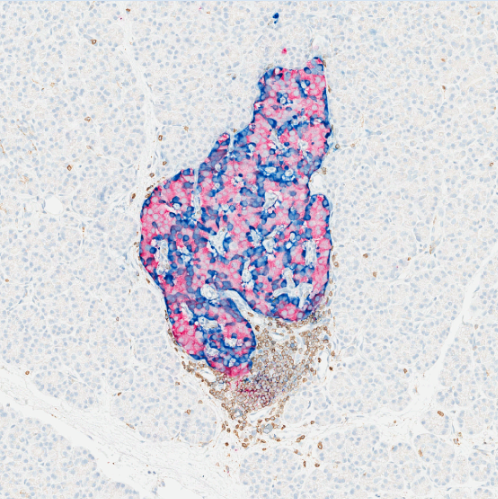
Welcome to the Network for Pancreatic Organ Donors with Diabetes (nPOD)
&
The Helmsley Charitable Trust George S. Eisenbarth nPOD Award for Team Science
T1D is considered a chronic autoimmune disease, over time leading to almost complete loss of pancreatic beta cells, resulting in severe loss of insulin secretion and hyperglycemia. Once diagnosed, patients depend on multiple daily insulin injections for their well-being. The disease often develops in children, but it also manifests in adult individuals. T1D is associated with increased risk of both acute and chronic complications, which carry significant morbidity and mortality. It is believed that T1D is a complex, multifactorial disease, with genetic and environmental factors playing an important role. Yet much remains to be learned about the causes and pathogenesis of T1D. There is a clear need to understand the causes of type 1 diabetes to develop the most effective therapies to prevent and cure diabetes.

Destruction of Pancreatic β Cells in Human T1D. Atkinson et al. (2020). Diabetologia. doi: 10.1007/s00125-020-05203-7
The limited access to the pancreas from living patients has traditionally prevented extensive investigations of the target organ. The Network for the Pancreatic Organ Donors with Diabetes (nPOD) was instituted in 2007 to address this limitation by obtaining pancreas and other tissues from organ donors with diabetes. Through the study of specimens from organ donors, nPOD is promoting research to test novel hypotheses about the pathogenesis and etiology of T1D.
Since inception nPOD has identified over 180 organ donors with T1D, and close to 50 donors that express T1D-associated autoantibodies, typically found in individuals with preclinical disease. Over the years, nPOD has provided tissue samples to over 300 investigators worldwide and supported over 245 research publications. nPOD has also facilitated the formation of highly collaborative working groups targeting key research areas in T1D.
nPOD aims at supporting innovative research projects with seed funding and encourages scientists from any discipline to engage in T1D research if they can contribute novel ideas, hypotheses, approaches and technologies. To this end, the Helmsley Charitable Trust has endowed nPOD with the George S. Eisenbarth nPOD Award for Team Science. This award has been named in honor of the late Dr. Eisenbarth, a pioneer in T1D research who inspired the nPOD concept. This program was established in 2015 to provide seed funding for innovative research projects that are centered on the study of nPOD donors. Since inception, this award has provided funding in support of 60 nPOD collaborative and pilot projects.
Investigators interested in examining nPOD specimens can apply using the project application form, in which they can present their project, request specimens and up to $50,000 plus 10% indirect cost for novel pilot projects. Awards are made for one year, but no-cost extensions are possible. Between 2021 and 2024 it is anticipated that nPOD will provide financial support to approximately 12 new projects. Once officially submitted to nPOD, proposals are reviewed by the nPOD Tissue Prioritization Committee, which conduct a rigorous scientific and feasibility review. The Committee also often constructive criticism and often suggests potential collaborators. Applications are reviewed approximately every 2 months. Please find review dates and submission deadline here. Additionally, Standard Operating Procedures can be found here.
Should you have questions about the application process please contact our Investigator Coordinator, Lisa Turk. Dr. Alberto Pugliese is nPOD’s Executive Co-Director, Chair of the review committee, and Principal Investigator of the Helmsley Charitable Trust George S. Eisenbarth nPOD Award for Team Science; he is available to discuss new ideas and will gladly offer guidance to prospective applicants.